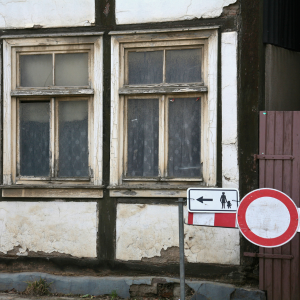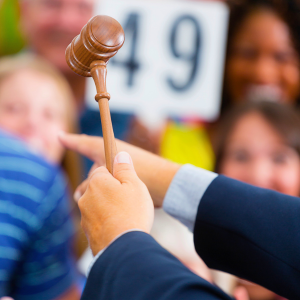|
Buying a house at auction
 Figures suggest that around one in every twenty properties on the market sell at auction. Generally, two factors make an auction sale more attractive to a seller:
Figures suggest that around one in every twenty properties on the market sell at auction. Generally, two factors make an auction sale more attractive to a seller:
- An auction sale may better suit a property that an estate agent will likely find challenging to market. That might be due to its condition, location, or both. That’s why a significant proportion of auction sales are to property developers.
- Generally, auction sales are considerably faster than the more traditional route.
Pros and cons of buying a house at auction
Being the only person to spot the potential in a property and bagging yourself a bargain is the dream scenario. However, auctions also increasingly attract buyers wishing to avoid the traditional conveyancing chain. As the sale is agreed as soon as the auctioneer’s hammer falls, there’s no chain to break – so no risk of gazumping.
Of course, if you lose out in a bidding war, you lose any money spent conducting surveys and other investigations on the property. And if you’re really unlucky, after investing time and money scrutinising a property, you may discover it’s been sold before it goes to auction.
How much does it cost to buy a house at auction?
In addition to the usual legal fees and Stamp Duty Land Tax, buying at auction means that in place of the estate agent’s commission, you pay a fee to the auctioneer called a ‘buyer’s premium’ or ‘administration fee’. The auctioneer receives this in addition to the fee they receive from the seller. The premium may be a flat fee or a percentage of the purchase price. It’s essential to check the auctioneer’s terms beforehand, as you must factor this additional cost into your budget.
Preparing to buy at auction
Keep an eye on auctioneers’ catalogues (usually available online). Once you have found a property you’re interested in, contact the auctioneer to arrange a viewing. Unfortunately, many houses sold at auction are not in the best condition. If that’s the case, before spending money on a survey, it’s worth taking a surveyor or architect for an initial walk around the property. They should be able to identify any of the more obvious problems and give you a broad indication of the cost of remedial work. At that point, you may decide that the likely costs involved are too high. Also, neighbours can be a great source of information on otherwise hard-to-spot issues.
 Always have a clear budget in mind to ensure you don’t pay over the odds. Never rely on the auctioneer’s guide price. It’s also not unusual for the guide price to increase before the auction. If it does, it usually means there’s been a lot of interest. Research similar properties on the market in the area and speak to local estate agents to gauge their opinions on valuation.
Always have a clear budget in mind to ensure you don’t pay over the odds. Never rely on the auctioneer’s guide price. It’s also not unusual for the guide price to increase before the auction. If it does, it usually means there’s been a lot of interest. Research similar properties on the market in the area and speak to local estate agents to gauge their opinions on valuation.
If you’re still interested, arrange a survey. Depending upon the condition of the property and any issues uncovered by your surveyor, you may need to arrange more than one type of survey or investigation. Remember, this is likely to be your first significant outlay in the process, and you won’t recover the cost if you’re unsuccessful at auction.
Auction legal pack
The seller will have prepared a package of documents, usually referred to as a ‘legal pack’. At the very least it should include:
- the title deeds for the property;
- the contract, which may show the fees you are required to pay (e.g. the seller’s legal fees and reimbursing the cost of the searches – which can surprise many purchasers);
- a local authority, environmental and other relevant searches;
- a list of fixtures and fittings;
- a seller’s information form; and
- any relevant leasehold information.
The legal pack will be available from the auctioneer. You should instruct your solicitor at the earliest possible opportunity before the auction. This ensures there’s sufficient time to review these documents properly and take any necessary action. The auction will proceed whether or not you’re ready, so time is very much of the essence.
As with any conveyancing transaction, your solicitor will inevitably need to raise further questions with the seller or their solicitor. This ensures you are fully aware of what you’re buying legally.
Buying a house at auction with a mortgage
The falling of the auctioneer’s hammer is akin to the exchange of contracts; you are committed to buying the property with completion typically fixed for 28 days later – sometimes even sooner. You must pay 10% of the hammer price immediately, with the balance on completion. This means that if you’re buying with a mortgage, you must ensure the mortgage is agreed in principle before the auction.
Crucially, if you cannot complete, you lose the property and your deposit. You may also have to cover the costs of re-selling the property and any shortfall between the price you agreed to pay and the final selling price. And you may even find yourself liable for daily interest until the property sells.
The auction
 If you’ve never been to an auction before, it’s advisable to attend a few and observe the proceedings to get a good idea of how they work.
If you’ve never been to an auction before, it’s advisable to attend a few and observe the proceedings to get a good idea of how they work.
On the day of the auction, stay calm! You’ll have done a lot of preparatory work and will know your budget. Never get carried away and exceed it. If you’re unsuccessful this time, other opportunities will come along.
It’s best to get there early and find a good spot where the auctioneer can see you easily. Check with the auctioneer in advance exactly what you’ll need to bring along. In most cases, you will need at least two forms of identification and proof that you can pay the 10% deposit.
Reserve price
The reserve price is different to the auctioneer’s guide price. It refers to a confidential figure set between the seller and the auctioneer. Where a reserve price is set, the bidding must reach that price before the auctioneer can sell the property. It’s worth remembering that if the property doesn’t reach the reserve price, on reflection, the seller may still decide to go with the highest bid, particularly if it was pretty close to the reserve price. If you were the highest bidder, you have nothing to lose by approaching the seller at the end of the auction.

 If you are considering buying a house at auction, here’s a short, helpful guide by residential property expert
If you are considering buying a house at auction, here’s a short, helpful guide by residential property expert